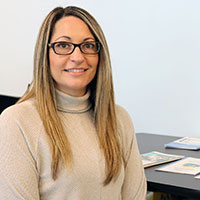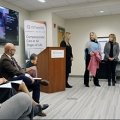Problem Gambling Treatment: Essential Services in a Changing Landscape

By Katie Kirch, LCSW, ICGC-II, BACC
Clinical Supervisor, Wheeler’s Bettor Choice Gambling Treatment Program
With Connecticut’s legalization of online sports betting last fall, calls to the CT Helpline for Gambling Treatment (888.789.7777), and related chat messages and texts for help, have increased dramatically, underscoring the need for additional support amid a changing landscape. Wheeler’s Bettor Choice Gambling Treatment Program, funded by the Connecticut Department of Mental Health and Addiction Services (DMHAS), can help individuals and families in central Connecticut, with clinicians specifically trained to treat gambling disorders.
While problem gambling is an ever-present challenge, it’s now measurably exacerbated by two factors, including easier access to online gambling and the ongoing effects of the COVID-19 pandemic.
More Access = More Risk
Online gaming literally affords people access to this process anytime, 24/7, on every day of the year. More individuals, including a younger demographic, are engaging in gambling right from their homes without frequenting venues such as casinos or racetracks. Statistically, rates of problem gambling double when people are within a certain proximity of a gambling establishment. With immediate access to cell phones, computers, and the issue of proximity removed, Connecticut residents are at a much greater risk for developing unhealthy behaviors.
Ongoing Effects of the Pandemic
The COVID-19 pandemic has been stressful for everyone; however, for people with an active gambling addiction, or who are in recovery, this period may be even more challenging because of the effects of prolonged isolation, boredom, economic instability, and fear. Some individuals who once turned to in-person gambling locales, cannot safely frequent casinos, or the racetrack, or other in-person gambling venues at this time and now are turning to online options. Remote working environments also offer additional opportunities for online play.
Help is Available
If you or a loved one are struggling with an active gambling addiction, or you are concerned about your recovery, call Wheeler’s Bettor Choice Gambling Treatment Program at 860-692-8857 or the CT Helpline at 888-789-7777. Free consultations are offered, and referrals and information will be provided for individuals and families outside of Wheeler’s Bettor Choice Gambling Treatment Program service area.
Our program includes individual, group, marital and/or family therapy. Financial and peer counseling are also available. Individualized treatment plans are developed for all clients to meet their specific needs.
Loved ones can also reach out to receive their own treatment and support. Bettor Choice programs in the state work closely with family members to help work through the emotional difficulties of discovering their loved one has a gambling disorder. This team works with families on issues such as anger, resentment, rebuilding trust, and regaining financial stability. Gam-Anon is also available for family members. The meeting list can be found at www.ctwmaga.org
Wheeler's Bettor Choice program is offered through our community health centers in Hartford, Bristol, and New Britain.
RELATED LINKS





